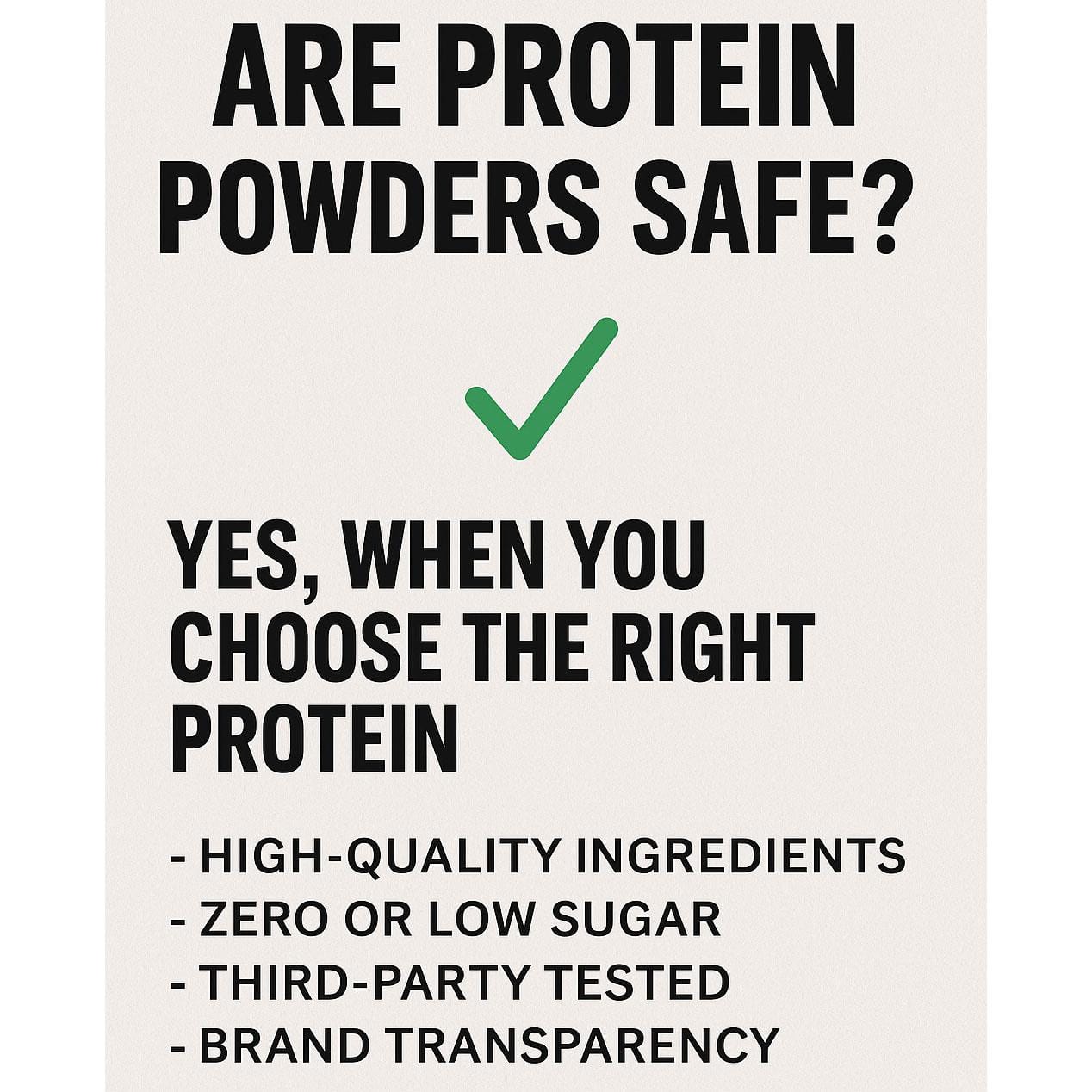In the world of fitness, wellness, and healthy living, protein powders have become one of the most popular supplements on the market. Whether you’re trying to build muscle, lose weight, or simply meet your daily nutritional needs, protein powder is often marketed as the quick, convenient solution.
But a question more and more health-conscious consumers are asking is:
Are protein powders safe?
Let’s explore the facts, debunk myths, and give you a science-backed, transparent look—especially if you’re considering a clean-label brand like Acacia Whey IsoLean™.
✅ Quick Answer: Yes, When You Choose the Right Protein
Protein powders are generally safe for most people when used appropriately and sourced from reputable, transparent brands. However, not all protein supplements are created equal.
Factors that determine safety include:
-
Protein source (whey isolate vs concentrate vs plant-based)
-
Additives and fillers
-
Sugar and carb content
-
Presence of allergens
-
Third-party testing and transparency
Let’s break these down in detail.
🧬 What Is Protein Powder, Exactly?
Protein powders are concentrated sources of protein extracted from foods like:
-
Milk (whey or casein)
-
Eggs
-
Soy, pea, rice, or hemp (plant-based options)
They are processed into powder form to deliver high-quality protein in a convenient way—ideal for shakes, smoothies, or baking.
Among these, whey protein isolate, like in Acacia Whey IsoLean™, is considered one of the safest and most effective forms due to its:
-
High bioavailability
-
Fast absorption
-
Complete amino acid profile
-
Low risk of allergens when lactose-free
⚠️ What Makes Some Protein Powders Unsafe?
Unfortunately, not all protein powders are safe—especially those that are:
-
Cheaply manufactured
-
Lacking quality control
-
Loaded with sugar or synthetic additives
Here are some red flags:
❌ Artificial Sweeteners & Fillers
Many mainstream brands use ingredients like:
-
Sucralose
-
Acesulfame K
-
Maltodextrin
-
Carrageenan
These can cause gut issues, inflammation, and blood sugar imbalances in sensitive individuals.
❌ Heavy Metals & Contaminants
Low-quality powders have been found to contain lead, arsenic, cadmium, and mercury, often due to poor ingredient sourcing and lack of third-party testing.
❌ High Sugar or Carb Content
Some “mass gainers” and meal replacements contain 10–30g of sugar per serving, defeating the purpose for those watching their weight, blood sugar, or on a low-carb diet.
🧪 What to Look for in a Safe Protein Powder
✔️ 1. Clean Ingredient List
The fewer the ingredients, the better. Look for:
-
100% whey protein isolate (or other clearly labeled sources)
-
Natural sweeteners like stevia or monk fruit
-
No gums, dyes, or preservatives
✔️ 2. Zero or Low Sugar
A truly clean protein powder has 0g added sugar and very low or zero carbs—ideal for people on keto, diabetics, or anyone avoiding insulin spikes.
✔️ 3. Third-Party Testing
Choose brands that test for:
-
Purity
-
Heavy metals
-
Protein content accuracy
✔️ 4. Brand Transparency
Is the company open about sourcing, ingredients, and testing? If not, it’s a red flag.
🌟 Why Acacia Whey IsoLean™ Sets the Gold Standard
At Acacia, we created Whey IsoLean™ to be everything the modern consumer is looking for in a safe, effective protein powder:
✅ 100% Whey Protein Isolate
-
Sourced from grass-fed dairy
-
Micro-filtered for purity
-
Naturally rich in essential amino acids
✅ Zero Carbs, Zero Sugar, Zero Fillers
-
Sweetened with monk fruit or stevia
-
No gums, lactose, soy, or gluten
-
Ideal for keto, low-carb, and diabetic-friendly diets
✅ Easy on Digestion
-
No lactose = no bloating or discomfort
-
Absorbs quickly for post-workout recovery or meal replacement
✅ Third-Party Lab Tested
Every batch is tested for:
-
Protein content
-
Contaminants
-
Heavy metals
-
Microbial safety
🏋️♀️ Who Should Use Protein Powder?
🔹 Busy Professionals
A scoop in your smoothie or coffee delivers clean fuel without the time commitment of cooking.
🔹 Athletes & Gym-Goers
Rebuild muscle and improve recovery with 25g+ protein in a fast-absorbing format.
🔹 Women on a Wellness Journey
Supports lean muscle, satiety, and hormone balance when sugar and fillers are avoided.
🔹 Low-Carb and Keto Dieters
Fuel your body with protein while staying in ketosis—no hidden carbs here.
🔹 Diabetics
Safe for blood sugar levels with zero added sugar and minimal glycemic impact.
🙋 Common Questions About Protein Powder Safety
Q: Can you take protein powder every day?
Yes. Most people can safely consume 1–2 scoops daily as part of a balanced diet. Consult your doctor if you have kidney issues or other chronic conditions.
Q: Can protein powder cause kidney damage?
No, not in healthy individuals. This myth has been debunked. If you have pre-existing kidney conditions, consult your healthcare provider.
Q: Is whey protein safe for women?
Absolutely. Clean, carb-free whey isolate like Acacia IsoLean™ is a great choice for women seeking lean muscle, fat loss, or better energy.
🌐 Final Verdict: Safe When You Choose Smart
So, are protein powders safe?
Yes—when you choose high-quality, clean-label options like Acacia Whey IsoLean™. Protein powder can be an incredibly convenient, effective, and safe way to meet your nutrition goals, support fitness, and stay energized throughout your day.



